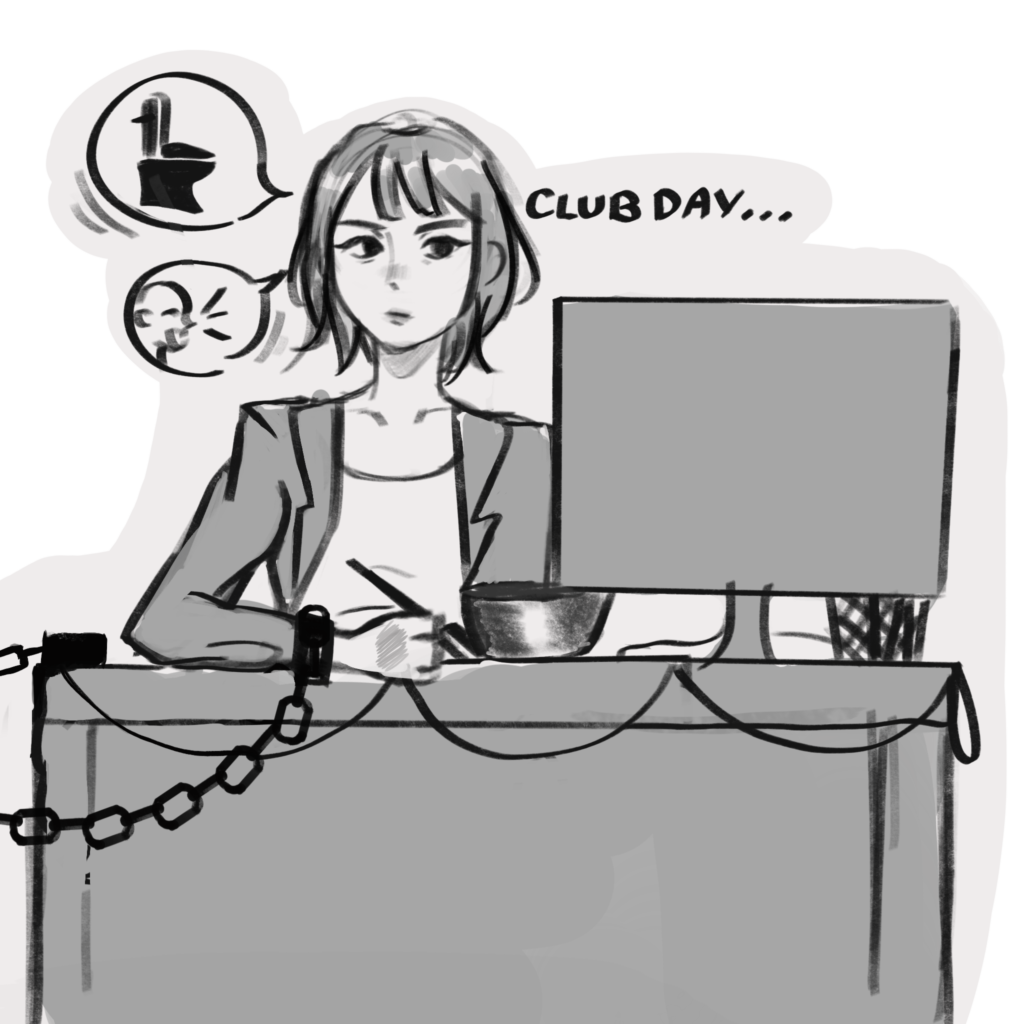
Allyson Chan
On Feb. 24, Aragon teachers received an email reminder that students must be supervised at all times when in classrooms. Although this email was not directed toward clubs and their advisers, they may be the most impacted.
Administrators have noticed unsupervised classrooms, especially during indoor lunches on rainy days. When campus safety specialists and assistant principals walked through hallways reminding students to pick up after themselves and that the gym was open, they saw several teachers missing from their classrooms.
“When we look at teacher contracts, teacher expectations and how we work with our students, it is expected that students are supervised in some way at all times,” said principal Valerie Arbizu. “When a teacher … opens up the classroom then removes themselves, they could be held accountable if something goes sideways.”
However, many teachers reacted negatively to this new enforcement, feeling that they need breaks from their classroom to use the bathroom and eat lunch.
“We were never supposed to [leave] students alone [in classrooms],” said chemistry teacher Cindy Henderson. “But it is difficult to … get a break in between. Maybe doubling advisers [or] a creative use of Flex-Time for clubs [could be solutions] … [However, it’s] going to take some work to fight the inertia of change.”
Other advisers wonder what prompted this reminder.
“I think some of the questions going through teachers’ minds are ‘did an incident happen,’ [or] ‘is there a difference between leaving students unsupervised in an open classroom versus leaving students unsupervised in the hallway?’” said chemistry and AVID teacher Max Von Euw. “I’m relatively new to Aragon, [but] it seems like there has been a system in place that worked [but] all of a sudden, we’re shifting things. There’s that old adage that goes ‘if it ain’t broke, don’t fix it.’”
Teachers with specialized equipment in their room, like science teachers, usually limit themselves to one club because of the additional level of risk.
“As a science teacher, because I have access to chemicals, you learn very early on that you can’t leave students here alone,” Von Euw said. “That’s why I only supervise one club, because I’m not willing to give up multiple lunches.”
One feasible solution according to Arbizu is giving teachers supervision hours for clubs.
“As part of [their] contract, [teachers] have to do some night supervision or afternoon supervision of extracurricular events,” Arbizu said. “What the teachers would like us to do is to take a look at how we assign supervision and what can count as that co-curricular supervision assignment.”
Some teachers believe that assigning supervision hours to lunchtime clubs will motivate teachers to remain in their classrooms.
“Teachers are allowed to have a 30-minute duty free lunch,” said English teacher Dena Johnson. “And so taking a club is volunteering their time. We do need to get out of our classrooms for a little bit during the day [but] I’m not opposed to what [administration is] trying to do. I just think that they need to work with the teachers to figure out a way to do it, like giving them supervision hours or something to compensate [them].”
Many favored having a shared space, like tennis courts, to host multiple clubs at once.
“When we had it out on the tennis courts [last year], that was awesome, because there was a supervisor there at all times,” said health and P.E. teacher Barbara Beaumont.
Some advisers, such as Chinese teacher and Chinese Culture club adviser Qi Fan, have begun to restrict meeting times, making them biweekly or shorter.
“A lot of our days kind of line up with Chinese celebrations and other festivities,” said Chinese Culture club vice president Madeline Dang. It’s going to be kind of hard to celebrate those with the club if it’s only biweekly.”
Some feel less willing to be advisers next year.
“I probably won’t allow my room to be used for clubs in the future,” said Foods & Nutrition and Culinary Arts teacher Jenna Meyer. “Garbage is [often] left behind in my classroom [and] the tables are dirty. I never know who the point of contact is so it’s hard to sort of reign it in and make sure my class is respected.”
On April 10, assistant principal Andrew Hartig put together an open meeting during lunch for teachers to express concerns and ideas for an improved club system for next year.
“The complaint was that the only way to maintain a robust club environment was to figure out some type of leniency with the requirement that students be supervised,” Arbizu said. “I don’t have the authority to say we’re not going to follow legal requirements. We do, however, have the ability to … look at teacher supervision points.”
No decisions will be made based on this preliminary meeting, but there may be more discussions in the future.
